Life at the End of History: Against Nineties Nostalgia
Posted By Travis LeBlanc On In North American New Right | Comments Disabled4,673 words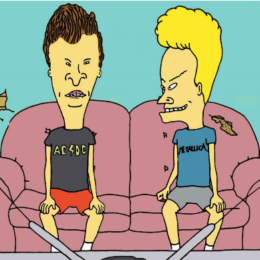
To understand the man you have to know what was happening in the world when he was twenty.
— Napoleon Bonaparte
I grew up in the final years of the Cold War. If you aren’t old enough to remember the Cold War, let me tell you that it was a trip.
The thing about living during the Cold War was that the possibility of nuclear war was in the back of your mind all of the time. It crossed your mind at least once a day. Because if it did happen, you would only have something like 18 minutes warning at most. That’s how long it would take for the missiles to get from Russia to the United States. And it could happen at any time [1]. So if you went to a restaurant or to the mall, the thought might cross your mind: “OK, what if the sirens started going off now? What would I do?” So you scan the place and look for the best place to duck under.
Everywhere you went, the thought crossed your mind that you might be in the last 20 minutes of your life. When you consume media from the ’80s, just know that no matter how cheesy it is, be it Porky’s, Flock of Seagulls, or Who’s the Boss, it was made by people who believed that they might be in the last 20 minutes of their lives. To this day, when I see one of those nuclear fallout shelter signs, I make a mental note of where I am just in case I’m in the area when the sirens go off. I know where the two nearest nuclear fallout shelters are from my apartment.
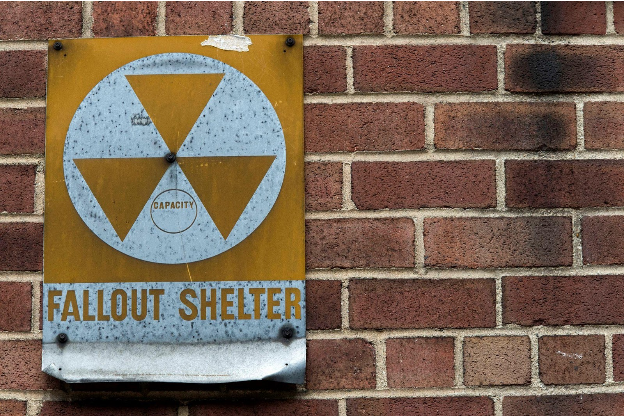
I remember being six or seven years old and my mother explaining to me what to do if there was a nuclear attack. If I was home, I was to go into the basement. If I was outside, I get into a ditch. One time in 2nd grade, my elementary school teacher stopped in the middle of class and started talking about nuclear war for a couple of hours. One of the other kids asked about it, but she went on a long tangent about it. I think she had recently watched The Day After [2], and it deeply affected her. (Good thing she didn’t watch Threads [3], which makes The Day After look like a Shirley Temple flick.)
In hindsight, that seems like some incredibly heavy shit to lay on a 7-year-old. Talking about millions of people dying (including, in all probability, at least some of your loved ones), the living envying the dead, and the struggle for survival if you were lucky enough to survive. It would never cross my mind to start getting that morbid as a child. But at the time, that was just something grown-ups had to do because it was a real possibility. You had to teach your kids what to do if there was ever a fire in the house, what to do if the was a tornado, and what to do if there was ever a nuclear attack.
But if you were to go back in time to the mid-80s and ask 7-year-old Baby Trav what he wanted to be when he grew up, Lil’ Baby Trav would have said “I want to be an army soldier so I can go kill communists.”
Now, I didn’t know anything about Marxist ideology at the time, but I had seen Rocky IV and Red Dawn and knew those guys were huge assholes. They hated America and didn’t believe in God. Say no more. That’s all Baby Trav needed to hear.
But there was more to it than that. There was an overwhelming sense at the time that there would eventually be some kind of showdown between the USA and USSR. It would be massive, bigger than anything that has ever happened before, and the world would never be the same afterward. And Baby Trav knew that when that shit went down, he wanted to be there.
But then the Cold War ended, and rather anticlimactically.
Rather than being crushed by American military might and the pure-of-heart heroics of the American fighting soldier, the USSR collapsed from the inside. Well, that was a curveball. The good news is that I no longer had to worry about dying in a nuclear attack, and I would be lying if I said that was not a huge load off my mind.
And yet I couldn’t help but feel a tiny bit disappointed. I had spent my life getting psyched up for this big showdown. I was looking forward to doing my bit in a grand world-altering struggle. Now, not only was that showdown not gonna happen, but there would be no more showdown. You see, now we’re at The End of History. We’ve got everything figured out now. We all agree on everything, so there’s nothing to fight over anymore. There are still some holdouts — some religious kooks in the Middle East and a handful of Third World dictators — but they’ll come around.
As a romantic, I couldn’t help but feel cheated by this turn of events. Cheated by life itself. I missed all the great struggles. I missed the Revolutionary War. I missed the Civil War. I missed Napoleon. I missed WWII. I was fine with missing WWI, because that war was kind of boring. And then the last great struggle there would ever be, the Cold War (which wasn’t even a real war) ended before I reached adulthood. I guess being born a white male in the United States is like winning the lottery of life, but when I was born, it felt like rolling snake eyes. Nothing I could possibly do with my life would be of interest to anyone 300 years from now. Even if I became the biggest rock star in the world, even that would fade in time. Only academics and eccentrics still watch Mary Pickford movies.
But then I got older, got redpilled, and realized, no, I was born at just the right time because I am actually right the middle of the greatest struggle of them all. The stakes are infinitely higher than anything that has come before. It’s even less of a “real war” than the Cold War was, but I’ll be damned if it isn’t a struggle of cosmic proportions. This is a struggle for survival. This is a struggle not merely to decide the fate of the European peoples, but the destiny of mankind [4]. So I finally got my struggle.
But now, the struggle ain’t going so well. The whole George Floyd thing happened, Black Lives Matter is rampaging through the streets, and then there’s the treachery. So much white treachery. Videos are going around of white people washing the feet of blacks, getting on their knees and kissing black men’s feet, and other embarrassing images. Blackpills are flying around, hot and heavy. Even eternal optimist Way of the World is saying it’s time to stick a fork in the West [5]. If you are not completely blackpilled, you are at the very least thinking “Damn, we’ve got a lot of work to do.”
We are most certainly entering the proverbial “times that try men’s souls.” Where we were once surfing the cultural waves of the Trumpian Zeitgeist with the wind at our backs, we now find ourselves swimming again the rising tide of neoliberalism. At times like this, it may be tempting to turn to nostalgia, to seek refuge in the past and memories of the good old days, of simple times and simple pleasures. This, I feel would be a mistake.
There was supposedly this expression in China: “May you live in interesting times [6].” And the thing about this expression was that it was supposed to be a curse; you see, interesting times are generally bad times to live through. The Civil War was pretty interesting, but eating boot-leather soup in Atlanta while under siege was not a pleasant place to be. If you wanted to live a happy and fulfilling life, it’s better to live through uninteresting times. Well, I think that’s bunk. I’ve lived through uninteresting times and to be honest, it kind of sucked.
The End of History
Ah, the 90s. The End of History. That space between the end of the Cold War and 9/11. Now those were uninteresting times.
Democratic capitalism had triumphed over all other systems, leaving monarchy, fascism, and communism in the dustbin of history. All the great questions had been figured out, nothing more to rack your brain over. All that was left were good times until the heat death of the universe. Political correctness was still in its infancy. The most burning political issue of the day was how big the federal government should be and whether or not to balance the budget. A TV show with an all-white cast was still uncontroversial and being pro-gay marriage was still pretty fringe. After the one-two punches of the L.A. Riots and the O.J. Simpson trial, the country had Negro fatigue, and racial politics took a back seat for a while.
There’s been a lot of 90s nostalgia going around lately, fueled in no small part by Netflix and Hulu. There has been a renewed interest in TV shows like Friends and X-Files.
Now, I understand the appeal of 90s nostalgia. You can watch a movie or TV show from the 90s and watch white people acting white and doing white things with other white people. Forced diversity in pop culture wasn’t what it is today. You had token blacks in shows, but a black co-worker or police chief was enough to fill the quota. The main cast could still be entirely white. Also, and perhaps more comforting, is the pop culture of the 90s was remarkably apolitical. You can watch movies and TV shows from the 90s and not be bombarded with Cultural Marxist propaganda. Sure, you had movies like Waterworld, which was a cautionary tale of what life would be like if we didn’t do something about global warming, but that movie was a rare exception (and ruthlessly mocked at the time). If you look at the most iconic 90s movies, like Pulp Fiction, Independence Day, Terminator 2, Titanic, or Jurassic Park, none of them had real overt political messages.
OK, so I guess Titanic dealt with issues of class, but that’s a timeless theme throughout the entire history of story-telling and it wasn’t done in a real heavy-handed Marxist sort of way. And maybe Terminator and Jurassic Park touched on the ethics and dangers of emerging technologies (artificial intelligence and genetic engineering), but those aren’t really left-right issues. That’s about as political as 90s pop culture got. So I get the appeal of 90s nostalgia. It’s escapist. You can lose yourself in an all-white world without being beaten over the head with political commentary. Personally, I get that from movies from the 1930s, which are even whiter and more apolitical than 90s movies with the added bonus of being less degenerate. I digress.
You can learn a lot about a time, place, and people by looking at the pop culture of the period. It’s only due to my love of 1930s cinema that I know what a Breach of Promise lawsuit is. Did you know that there was a time where if you banged a chick and did not marry her that she could sue you? I only know that because it was used as a plot device in a few old movies.
Granted, there are limitations to this approach. If I tried to understand 1940s America just from watching old Humphrey Bogart movies, I might get the impression that 1940s America was nothing but a bunch of world-weary antiheroes, hard-boiled femmes fatales, and colorful villains getting into misadventures together, and clearly, it was not. But the fact that the people of 1940s America chose someone like Humphrey Bogart to be their idol tells you something, no less than the fact that our society chose to hold the Kardashians up as idols tells you something about people today.
The reason I’m saying all this is because I am about to look at the 90s through the lenses of the pop culture of the time, and I’m acknowledging upfront the limitations of this approach. My contention is that if you look slightly beneath the gloss and glitter of the End of History, far from being carefree and idyllic, you see signs of a society slowly losing its mind.
In my opinion, with the exception of shoegaze and gangsta rap, nothing from the 90s has aged well.
One thing you notice about movies from the 90s is that so often the conflict is entirely internal. You have a guy who feels one way, and he wants to feel another way. American Beauty was like that. The guy feels bad and he wants to feel good. That’s the conflict. There is no villain in Clerks. You got this guy who doesn’t appreciate his girlfriend, and then he learns to appreciate her. That’s the conflict. Even Pulp Fiction ends with Samuel L. Jackson finding inner peace. After all the drugs, sex, and murder, that’s the grand finale of the movie. Samuel L. Jackson’s feelings change. Or you have movies like Usual Suspects, Donny Darko, or American Psycho, where the story all takes place in the guy’s head and you’re left wondering what, if any, of the story was real. Did I just spend 90 minutes in a guy’s head?
This is the kind of cultural product you get from a country that has no real problems. Or at least a country that doesn’t think it has any real problems. It’s a bunch of retarded self-absorbed introspection. Without an existential threat, people start to wallow in existential angst. This is the kind of cultural output you get from a society where everyone is 100% confident that they will still be alive in 20 minutes.
Only in the 90s could the biggest TV show in the country be (by its own admission) a Show About Nothing [7]. It was the End of History. There was nothing to worry about, so why not make a show about nothing?
Take American Beauty. The guy has a family. Lives with his biological child and her mother. Decent job and a middle-class lifestyle. And yet he’s not happy. Why not? He’s just not. OK, so his wife’s a bitch, and his daughter is also a bitch. But looking back at the movie from 2020, I want to tell the guy: “Bro, do you have any idea how hard it will become attain the kind of lifestyle you have now in the future?” Many zoomers, millennials, and even Gen X-ers would love to have this guy’s life and can’t.

What’s missing from his life is any sense of purpose. He got the job, the house, the family. Now what? Just keep living the same day over and over again? The rest of his life is laid out for him, and that is a depressing thought. He lives in a world without struggle. Life won’t provide him with a quest, so he has to create his own quest. And so he chooses making banging his teenage daughter’s best friend his new quest. Now, this quest is immoral and selfish for a myriad of reasons, but once he has set his mind to it, his mental and emotional state starts to improve.
This is what I remember about the 90s. Not the good times. Not the simple escapist pleasures, unmolested of political correctness. Not the easy, guilt-free laughs before the woke scolds made laughing a capital offense. Not the carefree existence of a mind unburdened by great questions which had all been sorted out (or so everyone thought). I remember the listlessness, the restlessness, and the longing for something more and only being able to find it. That’s what I remember when I think about life at the End of History.
To Choose Life or to Not Choose Life
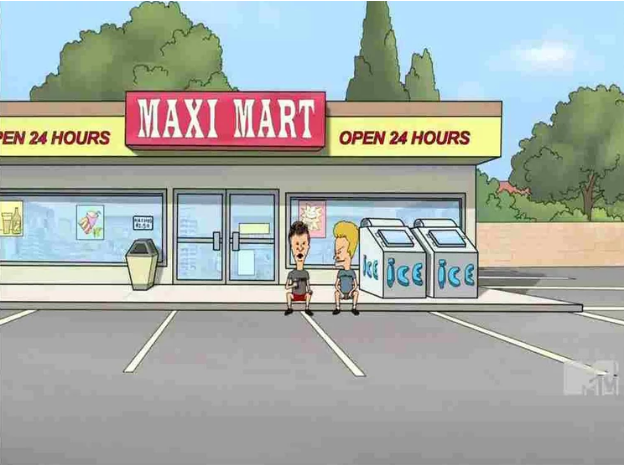
Beavis and Butthead might be the ultimate 90s show. I don’t think any piece of pop culture better encapsulates the Zeitgeist of the End of History better than Beavis and Butthead. The premise of the show was simple. It was two low-IQ teenage boys who spent all day watching TV and laughing at the stupid stuff they saw. Occasionally, they would go to the convenience store and stumble into some kind of misadventure on the way there. This was the entirety of their existence. The gag was that this made them archetypical “losers.”
But then again, what else was there to do in a world without struggle? Chase girls in hope for some meaningless sex? Get a job to buy cool stuff? Was there anything they could be doing that would be more meaningful when all the great problems of the world had been solved by the people who came before them? Was there something more important that they could be worrying about? Why not just waste your life away watching TV and cracking jokes with your friend? Beavis and Butthead didn’t seem particularly unhappy with their lives. They seemed quite content with their lot.
Still, one might say that Beavis and Butthead needed to “get a life.” But what did it mean to “get a life” at the End of History? For an explanation, we can look to another very 90s movie: Trainspotting.
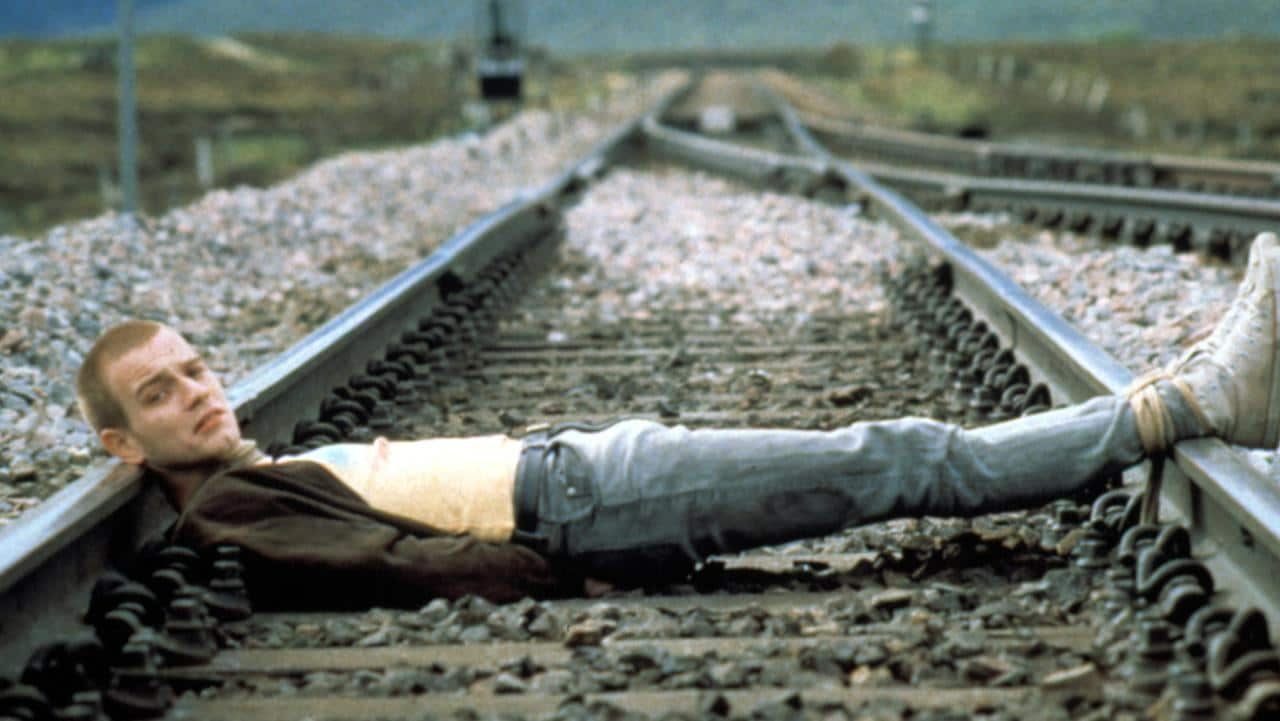
Choose a life. Choose a job. Choose a career. Choose a family. Choose a fucking big television. Choose washing machines, cars, compact disc players, and electrical tin openers. . . Choose DIY and wondering who the fuck you are on a Sunday morning. Choose sitting on that couch watching mind-numbing, spirit-crushing game shows, sticking junk food into your mouth. Choose rotting away in the end of it all, pishing your last in a miserable home, nothing more than an embarrassment to the selfish, fucked up brats you spawned to replace yourself, choose your future. Choose life. . . But why would I want to do a thing like that?
— Irvine Welsh, Trainspotting
Trainspotting was a literary sensation in the UK before becoming a cult classic indie film. It’s about a group of friends in Edinburgh and their struggles to get off, back on, and then back off heroin. In the book, it is more explicit about the fact that the gang are working-class ethnic Irish Catholics living in a society dominated by ethnic Sottish Protestants, thus compounding their alienation from it. This element is completely absent in the film and is only briefly alluded to [8] in the sequel, only to say that the Catholic-Protestant divide is not really an issue anymore.
The story centers around Mark Renton (portrayed in the movie by Ewan McGregor). While most of the Trainspotting gang are dysfunctional no-hopers who were probably always destined for a life of drugs and petty crime, Renton, the smartest of the bunch, could do more with his life if he wanted to. He just doesn’t want to.
When you’re on junk you have only one worry: scoring. When you’re off it you are suddenly obliged to worry about all sorts of other shite. Got no money: can’t get pissed. Got money: drinking too much. Can’t get a bird: no chance of a ride. Got a bird: too much hassle. You have to worry about bills, about food, about some football team that never fucking wins, about human relationships and all the things that really don’t matter when you’ve got a sincere and truthful junk habit.
Renton sees two options in life: being a heroin addict or being just another cog in the capitalist machine. Both appear to be soul-crushing, but heroin is a better high.
Nowadays, it is abundantly clear that for the West to survive, whites need to get good jobs, get married, and have children. In the Cold War, you had to have children because the commies were having children. So if you wanted freedom and apple pie to survive, you need to get married and have some kids. But in the 90s, it was like “why bother?” At the End of History, the West seemed and felt so invincible that one felt that they could be as self-destructive as they pleased and feel safe in the knowledge that society at large would still be just fine. What skin is it off your nose if Renton wants to waste his life away on drugs?
Compare Beavis and Butthead and Trainspotting to Kevin Spacey’s character in American Beauty.
Kevin Spacey’s character chose life. He chose the job, the family, the house, the mortgage, the big fucking television, and it all felt empty and meaningless. So he decides to pack in all in so he can live a low-stress life of working fast food, smoking weed, and living for today. After having chosen life, he decides it sucks and that he would much rather live a life more similar to that of Beavis and Butthead’s.
We live in a world where there is no shortage of struggles to choose from. And you can participate in them on your own in whichever insignificant or symbolic way is popular. These days, Beavis and Butthead would probably be shitlording it up on Right-wing message boards or trolling Jews on Twitter, while Kevin Spacey’s character in American Beauty might be your stereotypical “epic rant dad [9]” posting regular anti-Trump polemics on Facebook. It’s a better way to find meaning than trying to bang your teenage daughter’s friend.
Now, let me say that, yes, I am aware the Beavis and Butthead is “just a TV show” and American Beauty is “just a movie.” They are works of fiction and thus not picture-perfect representations of what life was like in the 90s. You might think that American Beauty was an assault on the traditional American family by Jewish Hollywood or that Beavis and Butthead had implicitly anti-white male overtones or was ridiculing white male companionship or whatever. Maybe there is something in that.
But the fact that these shows resonated so deeply with people at the time says something. People in the 90s could identify with that post-Cold War ennui, a world without struggle, where all life seemed to be was just chasing scraps of happiness while patiently waiting to die.
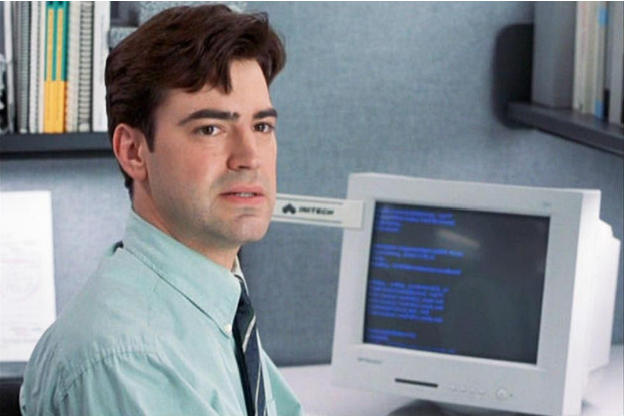
Another movie where you see this is Office Space starring Ron Livingston. Here’s another guy who chose life. He went to college, got the job in the office, and while he doesn’t have a family yet, he has a serious girlfriend, so he’s following the plan. And yet he is profoundly unhappy with his life. It lacks any meaning. He estimates that he does about 20 minutes of “actual work” per week, so he can’t even take pride in that. Even as a cog in the capitalist machine, he is completely superfluous. Ron Livingston decides he would be much happier if he just stopped going to work and instead spent all day at home watching stupid shit on TV with his girlfriend. In other words, he wants to be Beavis and Butthead.
You can see a pattern forming here. Without struggle, there is the temptation to just turn into Beavis and Butthead.
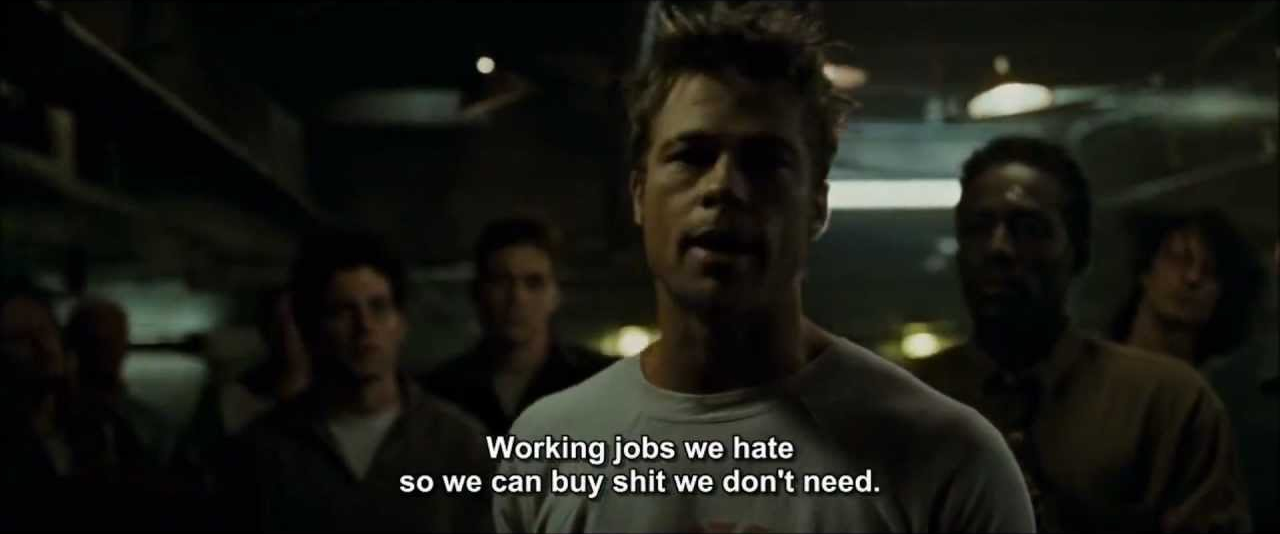
We see this also in another classic 90’s film: Fight Club.
Fight Club is about another person who “chose life.” Edward Norton is not married or with kids yet, but he chose the school, the fancy job, and the nice place with a fucking big television. And he found it all empty and unfulfilling. But Ed Norton is not content to just become Beavis and Butthead. He longs for a sense of purpose, so he creates Fight Club as a means of allowing men to release the primal energies that in days past could be focused on some greater existential struggle.
This is perhaps summed up best in Durden’s famous speech:
Man, I see in Fight Club the strongest and smartest men who’ve ever lived. I see all this potential, and I see squandering. God damn it, an entire generation pumping gas, waiting tables; slaves with white collars. Advertising has us chasing cars and clothes, working jobs we hate so we can buy shit we don’t need. We’re the middle children of history, man. No purpose or place. We have no Great War. No Great Depression. Our Great War’s a spiritual war. . . our Great Depression is our lives. We’ve all been raised on television to believe that one day we’d all be millionaires, and movie gods, and rock stars. But we won’t. And we’re slowly learning that fact. And we’re very, very pissed off.
The End of History was a nice place to visit, but you wouldn’t want to live there. It was a great place to be if you were an NPC. If, like Beavis and Butthead, you cared about nothing, your mind unburdened by great questions, nothing of the past or the future, and were content merely to live for today and the next new TV season, then the 1990s were great. But if you were of the romantic or creative variety, the 90s were actually kind of dystopian.
Grunge was the soundtrack of my high school years, and all the lead singers of those bands now are dead from either drugs or suicide. All of them! The singer of Nirvana died from suicide. The singer of Alice in Chains died from drugs. The singer of Soundgarden died from suicide. The singer of Stone Temple Pilots died from drugs. Only Eddie Vedder of Pearl Jam is still alive, but even Pearl Jam’s first singer [10] (when they were called Mother Love Bone) died from drugs. So they all had singers die from either drugs or suicide.
These were people who were adored by millions, who had unlimited sexual options and the resources to do whatever they pleased, to travel wherever they wanted, to surround themselves with any or all of the material comforts money could buy. And they still felt the need to pump themselves full of Schedule I hard drugs to make the experience of modernity bearable. These are the kind of people that the End of History produced.
Watching statues of our old heroes get pulled down and cities in flames, the 90s might seem like a utopian place. And in some ways, that’s right. But I was there. People forget how absolutely soul-crushing living in utopia can be. I would never want to go back there. Give me a Cause. Hell, I’ll even take a Lost Cause. Even a Lost Cause is better than no Cause at all.
For most of my life, I would hear the story of Adam and Eve and think about how stupid those two must have been. They were living in paradise and just threw it all away. They had one rule: don’t seek knowledge. As long as you don’t seek knowledge, you can live in paradise forever. But as time went on, I began to understand their decision more and more. As shitty as things are now, I find being redpilled in nightmare hellscape of 2020 a far more fulfilling existence than being blissfully ignorant in utopian 1995.
Now, maybe things will get worse. Like, a lot worse, and I might change my tune. Maybe after racism is declared a mental illness and I’m hauled off to a looney bin which will actually be a de facto re-education camp, sitting in my straitjacket and padded cell, I may start waxing nostalgic for the days of Spice Girls and Saved By the Bell.
But as I write this, there is no other place that I would rather be than right here and right now.
If you want to support our work, please send us a donation by going to our Entropy page [11] and selecting “send paid chat.” Entropy allows you to donate any amount from $3 and up. All comments will be read and discussed in the next episode of Counter-Currents Radio, which airs every Friday.
Don’t forget to sign up [12] for the twice-monthly email Counter-Currents Newsletter for exclusive content, offers, and news.